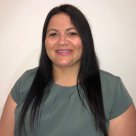In honour of Indigenous Peoples Day, residential school survivors in Nova Scotia returned to the former Shubenacadie site to reclaim their culture in the very place where it was stripped away more than five decades ago.

Mi’kmaw children from across the Maritimes were taken from their families and sent to the school where they suffered years of abuse at the hands of the Catholic church.
Annually, on June 21, the children were released back to their families for the summer. They would walk from the school site to the train station and travel back to their respective communities. This was considered their Freedom Walk or Freedom March.
Elmer “Fudd” Lewis, a survivor of the residential school system, went to the school as a five-year-old boy and left when he was “graded out” in Grade 8. He said he still suffers severe trauma as a result.
“I lost my language and my culture, and that’s a big thing there. And, I had no feelings for love, I didn’t know what love was. I had to find out the hard way,” said Lewis.
Lewis said it was always his dream to retrace the footsteps of the walk he took many years ago to commemorate the lives lost in the residential school system. He said it’s also important to raise awareness for the continued search for the unmarked graves of Indigenous children across the country at former sites.
- Life in the forest: How Stanley Park’s longest resident survived a changing landscape
- ‘They knew’: Victims of sexual abuse by Ontario youth leader sue Anglican Church
- Carbon rebate labelling in bank deposits fuelling confusion, minister says
- Buzz kill? Gen Z less interested in coffee than older Canadians, survey shows
His daughter, Tara, was one of the organizers of the second annual event.
Benjamin Lafford also spent years of his childhood at the Shubenacadie Residential School. He said he had anxiety on his journey to the former site from his home in Eskasoni, and that he is still haunted by the memories to this day.
“I remember a little boy who died here in 1963. I know his body is still there. No police ever came, no ambulance.” he said.
He said the trauma inflicted on him caused him to use alcohol and drugs as a coping mechanism.
“There were sexual abuse, physical abuse, emotional abuse and spiritual abuse,” he said.
Cassidy Gallant helped Lewis’ daughter organize the event. Gallant’s great-grandmother spent years at the Shubenacadie Residential School as a child and the experience took a toll on the remainder of her life.
“She never liked to talk about it from what I know. And, she didn’t like to take part in her culture that much, and she became an alcoholic, and she had a lot of that trauma that she never got to work through,” said Gallant.
Gallant said she’s grateful to be breaking through the intergenerational trauma that has also impacted her greatly.
“I’m actually a recovering alcoholic myself. I have been sober for three years. And, I think she would be proud that I’m trying to break that generational trauma that we have in our family.”
Lewis said he has hopes one day seeing the former Shubenacadie Residential School site turned back to the Mi’kmaq community to honour the legacy of the children who suffered extensively.
“I would really like it if they had put a museum and put it up on top of the hill, all our culture, artifacts, for all the communities,” he added.
Although it’s painful to relive residential school memories, families say they’re now focused on moving forward.
“All that generational trauma started here and this is where we want that generational healing to start — is here.” said Gallant.




Comments